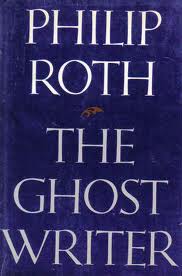.jpg) Critical Mass postings celebrating Philip Roth include a podcast of the National Book Critics Circle collaboration with the Center for Fiction in celebration of Philip Roth, a 50-minute video of Roth reading from his NBCC-award winning autobiography, Patrimony: A True Story, his acceptance speech when he won the National Book Critics Circle fiction award for The Counterlife in 1988, Nathan Englander's essay on the impact of Portnoy's Complaint, and a range of reviews, including this one. In an August 2010 essay in the Critical Mass “In Retrospect” series, Wyatt Mason reviewed Roth's The Ghost Writer. (Complete review here.)
Critical Mass postings celebrating Philip Roth include a podcast of the National Book Critics Circle collaboration with the Center for Fiction in celebration of Philip Roth, a 50-minute video of Roth reading from his NBCC-award winning autobiography, Patrimony: A True Story, his acceptance speech when he won the National Book Critics Circle fiction award for The Counterlife in 1988, Nathan Englander's essay on the impact of Portnoy's Complaint, and a range of reviews, including this one. In an August 2010 essay in the Critical Mass “In Retrospect” series, Wyatt Mason reviewed Roth's The Ghost Writer. (Complete review here.)
…The novel’s third section, “Femme Fatale,” offers any reader or re-reader the clearest possible explanation not only for why The Ghost Writer is a perfect novel, but also why Philip Roth has laid claim to public imagination for fifty years: not that he writes about sex, or self, or any particular subject, but because he has the capacity, though story, to transform what we understand reality—that increasingly circumscribed noun—to be.
And, of course, Roth transforms the world into language. In an era when every new writer armed with adverbs is called a magician of prose, it is perhaps useful to be reminded, on every page in The Ghost Writer, what real magic does…
“There was still more wind than snow, but in Lonoff’s orchard the light had all but seeped away, and the sound of what was on its way was menacing. Two dozen wild old apple trees stood as first barrier between the bleak unpaved road and the farmhouse. Next came a thick green growth of rhododendron, then a wide stone wall fallen in like a worn molar at the center, then some fifty feet of snow-crusted lawn, and finally, drawn up close to the house and protectively overhanging the shingles, three maples that looked from their size to be as old as New England. In back, the house gave way to unprotected fields, drifted over since the first December blizzards. From there the wooded hills began their impressive rise, undulating forest swells that just kept climbing into the next state. My guess was that it would take even the fiercest Hun the better part of a winter to cross the glacial waterfalls and wind-blasted woods of those mountain wilds before he was able to reach the open edge of Lonoff’s hayfields, rush the rear storm door of the house, crash through into the study, and, with spiked bludgeon wheeling high in the air above the little Olivetti, cry out in a roaring voice to the writer tapping out his twenty-seventy draft, 'You must change your life!'”


